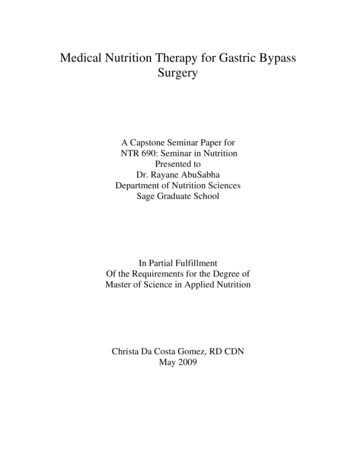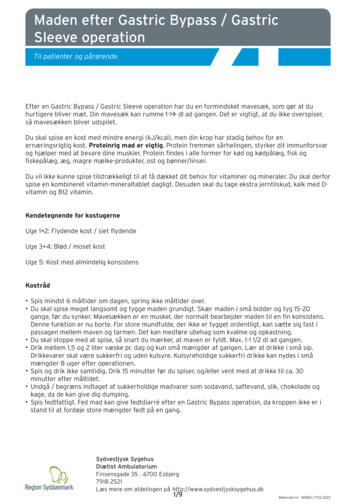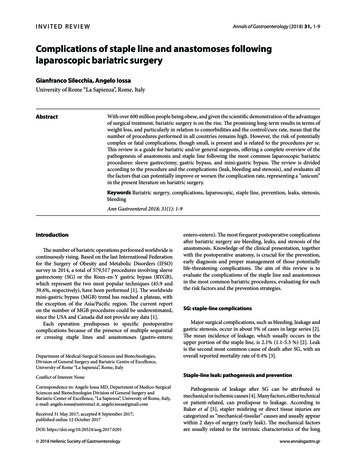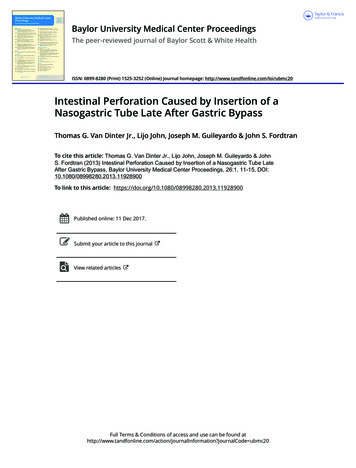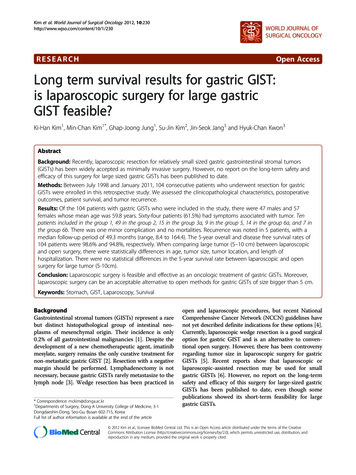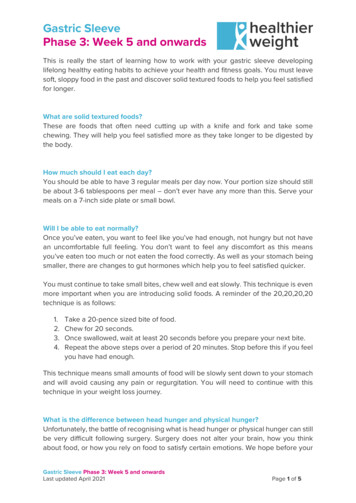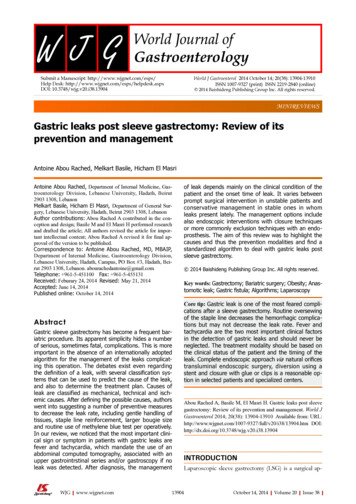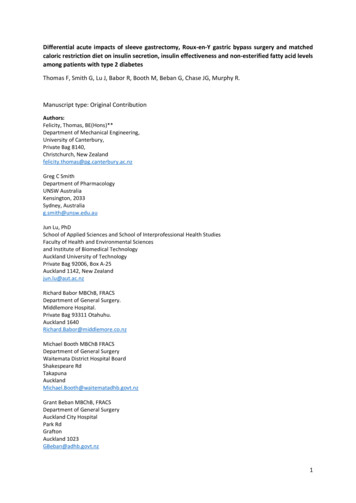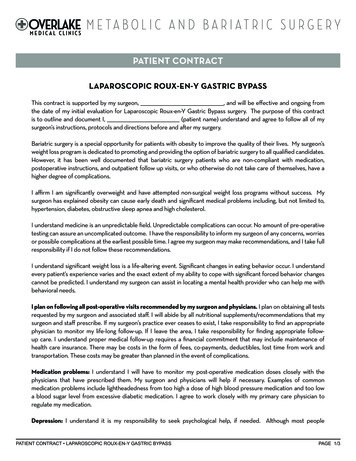
Transcription
PATIENT CONTRACTLAPAROSCOPIC ROUX-EN-Y GASTRIC BYPASSThis contract is supported by my surgeon, , and will be effective and ongoing fromthe date of my initial evaluation for Laparoscopic Roux-en-Y Gastric Bypass surgery. The purpose of this contractis to outline and document I, (patient name) understand and agree to follow all of mysurgeon’s instructions, protocols and directions before and after my surgery.Bariatric surgery is a special opportunity for patients with obesity to improve the quality of their lives. My surgeon’sweight loss program is dedicated to promoting and providing the option of bariatric surgery to all qualified candidates.However, it has been well documented that bariatric surgery patients who are non-compliant with medication,postoperative instructions, and outpatient follow up visits, or who otherwise do not take care of themselves, have ahigher degree of complications.I affirm I am significantly overweight and have attempted non-surgical weight loss programs without success. Mysurgeon has explained obesity can cause early death and significant medical problems including, but not limited to,hypertension, diabetes, obstructive sleep apnea and high cholesterol.I understand medicine is an unpredictable field. Unpredictable complications can occur. No amount of pre-operativetesting can assure an uncomplicated outcome. I have the responsibility to inform my surgeon of any concerns, worriesor possible complications at the earliest possible time. I agree my surgeon may make recommendations, and I take fullresponsibility if I do not follow these recommendations.I understand significant weight loss is a life-altering event. Significant changes in eating behavior occur. I understandevery patient’s experience varies and the exact extent of my ability to cope with significant forced behavior changescannot be predicted. I understand my surgeon can assist in locating a mental health provider who can help me withbehavioral needs.I plan on following all post-operative visits recommended by my surgeon and physicians. I plan on obtaining all testsrequested by my surgeon and associated staff. I will abide by all nutritional supplements/recommendations that mysurgeon and staff prescribe. If my surgeon’s practice ever ceases to exist, I take responsibility to find an appropriatephysician to monitor my life-long follow-up. If I leave the area, I take responsibility for finding appropriate followup care. I understand proper medical follow-up requires a financial commitment that may include maintenance ofhealth care insurance. There may be costs in the form of fees, co-payments, deductibles, lost time from work andtransportation. These costs may be greater than planned in the event of complications.Medication problems: I understand I will have to monitor my post-operative medication doses closely with thephysicians that have prescribed them. My surgeon and physicians will help if necessary. Examples of commonmedication problems include lightheadedness from too high a dose of high blood pressure medication and too lowa blood sugar level from excessive diabetic medication. I agree to work closely with my primary care physician toregulate my medication.Depression: I understand it is my responsibility to seek psychological help, if needed. Although most peoplePATIENT CONTRACT LAPAROSCOPIC ROUX-EN-Y GASTRIC BYPASSPAGE 1/3
PATIENT CONTRACTexperience improvements in their mood, some will have worsening states of depression. Weight loss is not a cure-allfor all psychological problems. It is my responsibility to seek psychological help when necessary.Smoking and other addictions: If I currently smoke, I agree to and take full responsibility to quit smoking to preventpotential life threatening illnesses. Addiction to alcohol, narcotics and other illicit drugs will severely impact my health.Return to work: I understand although many patients can return to work within one to two weeks, some patients mayrequire a longer recovery. My surgeon and physicians are not responsible for any financial difficulties due to lost worktime.Osteoporosis: Calcium deficiency may occur years after a laparoscopic Roux-en-Y Gastric Bypass. This is a difficultto diagnosis to make until weakness of the bones has already developed. I understand I am expected to take calciumsupplements and supplemental Vitamin D for life after this operation.B vitamin deficiencies: I understand deficiencies in Thiamine, Niacin, B12 and others have been reported followingweight loss surgery. These B vitamin deficiencies are very rare. Some B vitamin deficiencies can cause irreversibleneurological damage. All patients are required to take a multivitamin supplement for life after this operation. Sometimes,additional B vitamin supplements are also required.Abdominal pain: I understand some patients may develop a twist in their intestines after this operation which maycause intermittent and/or severe abdominal pain, and which can, in rare cases, be fatal. These symptoms may occur anytime after surgery. X-ray tests may not show the abnormality. Only a qualified bariatric surgeon is trained to diagnoseand treat this problem. If I develop abdominal pain after my laparoscopic Roux-en-Y Gastric Bypass, I will notify mybariatric surgeon.Poor weight loss and weight regain: Weight regain may occur, especially with “grazing” behavior. Constantly eatingfoods such as chips and nuts or other high calorie snacks will result in less than expected weight loss or even weightregain. I will take responsibility for my eating behaviors.Exercise is an excellent means to improve health and maintain weight loss. I take responsibility to increase myphysical activity and will discuss with my surgeon and physicians healthy ways to do so.Weight loss after a laparoscopic Roux-en-Y Gastric Bypass is expressed as loss of a percentage of my pre-operativeexcess body weight. Excess weight is defined as my current weight minus my ideal body weight. On average, patientslose between 70% and 80% of excess weight at two years. The range of excess weight loss that nearly all patientsexperience may range widely from 40% to 100%. My surgeon will give me recommendations on how to experiencethe most optimal weight loss. Although the majority of patients are satisfied with their weight loss, there is no guaranteethat I will achieve my goal weight.I understand that the chances of reaching my ideal body weight are low. I understand bariatric surgery is a tool thatassists with weight loss. I understand most patients will regain some weight, and a few can regain substantial weight.I understand it is my responsibility to maintain healthy eating and exercise habits as prescribed by my surgeon andphysicians to assist in maintenance of optimum weight loss.PATIENT CONTRACT LAPAROSCOPIC ROUX-EN-Y GASTRIC BYPASSPAGE 2/3
PATIENT CONTRACTPregnancy: Women who were infertile may become fertile after their laparoscopic Roux-en-Y Gastric Bypass surgery.If I am a female, I understand I will need to use birth control to prevent unexpected pregnancies for 12 months afterthis procedure. The risks associated with pregnancy in an obese person are generally higher than those in a non-obeseperson. There is no significant data to suggest the risks of pregnancy are greater, either to the mother or child, afterlaparoscopic Roux-en-Y Gastric Bypass surgery. However, the safety of pregnancy is NOT established for patientsor their fetus during periods of rapid weight loss. For this reason I agree not to become pregnant for 12 monthsafter my laparoscopic Roux-en-Y Gastric Bypass surgery. I understand serious, life-threatening complications mayoccur. I take full responsibility for using birth control during this period of time.If I intend to become pregnant, I agree before and during pregnancy I will discuss my nutritional needs with my surgeonand obstetrician. I will always make sure that I am taking adequate vitamins and minerals throughout pregnancy andwhile nursing. I understand my surgeon is not responsible for complications of pregnancy as complications may occurwith any pregnancy, and there is no definitive means to prove any complication during pregnancy was due solely to thelaparoscopic Roux-en-Y Gastric Bypass surgery.I understand I may not be able to breastfeed during periods of rapid weight loss. If I am currently breastfeeding, I planto wean my child before undergoing weight loss surgery.Thiscontract has been thoroughly reviewed and explained to me, and my signature reflects my understanding of itspurpose and expectations, as well as my agreement to its terms.By signing this contract, I agree to follow the guidelines and instructions set forth above, and understand my failure tocomply may impact the result of my surgery.Patient SignatureDateSurgeon SignatureDateWitness SignatureDatePATIENT CONTRACT LAPAROSCOPIC ROUX-EN-Y GASTRIC BYPASSPAGE 3/3
INFORMED CONSENT FOR LAPAROSCOPIC ROUX-EN-Y GASTRIC BYPASSPlease read this form carefully and ask about anything you may not understand.I consent to have a laparoscopic Roux-en-Y Gastric Bypass for the purpose of weight loss. I met my attending surgeonin the office during my initial consultation. My attending surgeon will perform the procedure, direct my care during theoperation, and may be assisted by other physicians, fellows and/or residents under his or her supervision.As has been explained to me, obesity is associated with early death and significant medical problems such ashypertension, diabetes, obstructive sleep apnea, high cholesterol, infertility, cancer, gastroesophageal reflux, arthritis,chronic headaches, gout, venous stasis disease, liver disease and heart failure, among other problems.My attending surgeon has explained to me that laparoscopic Roux-en-Y Gastric Bypass can improve or cause remissionof many medical problems such as hypertension, diabetes, obstructive sleep apnea, high cholesterol, infertility, cancer,gastroesophageal reflux, arthritis, chronic headaches, venous stasis disease, liver disease and heart failure. I understandthere are no specific guarantees that any one of these conditions will improve or resolve in any given patient as a resultof the surgical procedure.My attending surgeon has discussed with me the alternatives to laparoscopic Roux-en-Y Gastric Bypass surgery, whichinclude non-surgical options. The opportunity to discuss other surgical options such as implantation of a laparoscopicadjustable gastric band has been made available to me. I have advised my surgeon that I have attempted non-surgicalweight loss programs without success.I understand the anatomy of the laparoscopic Roux-en-Y Gastric Bypass procedure and have been shown illustrationsof the procedure.I have been given the opportunity to discuss alternative methods for weight loss. This includes diet and exercise aswell as other surgical methods. I believe that the laparoscopic Roux-en-Y Gastric Bypass procedure offers the bestbalance between risks and benefits for me.I understand the incidence of complications may be dependent on my particular medical history as well as my surgeon’slevel of training and experience. I have discussed these issues specifically with my surgeon.I understand the risks of the laparoscopic Roux-en-Y Gastric Bypass include, but are not limited to the following:INTRA-OPERATIVE AND/OR IMMEDIATE POST-OPERATIVE RISKS:Death: The mortality rate of the laparoscopic Roux-en-Y Gastric Bypass nationwide is 0.3% to 2%.Significant Bleeding: Bleeding may occur unexpectedly in the operating room. Bleeding may also occur post-operativelyin the days after the operation. This bleeding may be through the intestinal tract at the anastomosis and result in thepassage of blood in the stool. Bleeding may also be unseen inside the abdomen and be diagnosed through othermeans. A transfusion may be necessary in some circumstances. Re-operation to stop bleeding may be necessary.PATIENT INITIAL EACH PAGE:Date:INFORMED CONSENT FOR LAPAROSCOPIC ROUX-EN-Y GASTRIC BYPASSPAGE 1/5
Anastomotic Leak: A leak is when the connection between the stomach and the intestine does not heal. Seriouscomplications can result from a leak, including, but not limited to a prolonged hospital stay, a long period of nothingto eat, prolonged antibiotic requirements, organ failure and death. The reported incidence of anastomotic leaknationwide ranges from 0.5% to 3%.Renal Failure: Transient kidney (renal) failure occurs rarely. Irreversible kidney failure has been reported in rare cases.Prolonged Ventilation: A prolonged stay on a ventilator (breathing machine) in the intensive care unit may occur if apatient has severe sleep apnea or after certain significant complications. A temporary tracheostomy may be necessary.Heart Attack: Although a heart attack is possible after a laparoscopic Roux-en-Y Gastric Bypass, it is very rare. Riskfactors for heart disease include increased age, diabetes, hypertension, hypercholesterolemia and a family history ofheart disease.Prolonged Hospital Stay: Unforeseen complications may result in a prolonged hospital stay. Intensive care admissionmay be required.Bowel Obstruction: An obstruction can occur that would require re-operation. An obstruction can occur from anumber of causes, such as bleeding, scarring, technical problems or hernia.Deep Vein Thrombosis (DVT)/Pulmonary Embolism: Blood clots that form in the legs, and elsewhere, and break offinto the lungs may cause death. Given this risk, treatments may be initiated to decrease the risk for the formation ofblood clots, including the use of heparin (a medication that thins the blood), special foot and leg stockings, walkingsoon after surgery and medication at home after discharge from the hospital. Completely eliminating the risks ofDVT (clots) altogether is not medically possibly. The risks associated with the medications used to prevent blood clotscan include excessive bleeding. Any symptoms of leg swelling, chest pain or sudden shortness of breath should beimmediately reported to the surgeon. Rarely, patients develop allergies to heparin, sometimes causing very severereactions.Other Complications that may be common: Allergic reactions, headaches, itching, medication side-effects, heartburn/reflux, bruising, gout, anesthetic complications, injury to the bowel or vessels, gas bloating, minor wound drainage,wound opening, scar formation, stroke, urinary tract infection, urinary retention, pressure sores, injury to spleen orsurrounding structures, and pneumonia.Risks Associated with an Open Procedure: If a conversion to an open procedure is required, complications includebut are not limited to: wound infection, which may cause significant scarring and healing problems, prolonged woundcare, and discomfort. Incisional hernias occur in approximately one-third of patients after an openRoux-en-Y Gastric Bypass. Hernias will often require an operation to repair. There is a higher chance of certaincomplications including lung infections, pressure ulcers and blood clots after an open operation. There would alsolikely be more discomfort and a longer hospital stay.RISKS IN THE EARLY POSTOPERATIVE PERIOD:Stricture: It has been reported that connection between the stomach and the intestine, the gastrojejunostomy, canPATIENT INITIAL EACH PAGE:Date:INFORMED CONSENT FOR LAPAROSCOPIC ROUX-EN-Y GASTRIC BYPASSPAGE 2/5
scar to the size of a pinhole. This is a relatively common complication. This scarring is diagnosed by the intolerance tosolid foods after surgery. A stricture can be treated by endoscopic balloon dilation. Under sedation, a scope (1/2-inchdiameter tube with a camera) is placed through the mouth and into the stomach pouch. The stricture is then dilatedwith a balloon. On occasion, a dilation may be required several times. Very rarely, re-operation would be necessary.Ulcer: An ulcer can cause pain, bleeding or result in a perforation. Ulcers are more common in patients who takemedications such as aspirin, Advil , Motrin , Aleve , Ibuprofen, or other drugs classified as NSAIDS. Aspirin, Celebrex and Vioxx can cause ulcers when used for prolonged periods of time. Also, patients who smoke tobacco are at higherrisk for the development of an ulcer.Fatigue: After any general anesthesia, fatigue is very common. Fatigue may last days, or in some circumstances, muchlonger.Food Intolerance: Following laparoscopic Roux-en-Y Gastric Bypass, patients may experience an intolerance tocertain food types, usually fatty greasy foods, dairy products and/or sweets, which may cause unpleasant symptomssimilar to seasickness such as sweating, nausea, diarrhea and shaking. These symptoms may last from a few minutes toan hour. This is called “dumping.” Food intolerances vary from person to person. Some patients never experience anyof these symptoms, or may become less sensitive over time. Rarely, a patient may have severe food intolerances thatlast for many months.LATE COMPLICATIONS:Osteoporosis: Calcium deficiency may occur years after a laparoscopic Roux-en-Y Gastric Bypass. This is a difficultdiagnosis to make until weakness of the bone has already developed.Iron Deficiency Anemia: Since iron is not as easily absorbed after the laparoscopic Roux-en-Y Gastric Bypass,supplements are generally recommended in all patients to prevent anemia. Serious complications can occur withsevere anemia. Iron stores can be measured by blood tests and should be routinely performed. Sometimes oral ironsupplements are not adequate to treat anemia and intravenous iron is recommended.B Vitamin Deficiencies: Deficiencies in Thiamine, Niacin, B12 and others have been reported. These B vitamindeficiencies are very rare. Some B vitamin deficiencies can cause irreversible neurological damage. All patients arerequired to take a multivitamin supplement for life after this operation. Sometimes, additional B vitamin supplementsare also required. It is important to be evaluated regularly for vitamin deficiencies after surgery. Severe vomiting is arisk factor for the development of B vitamin deficiencies.Bowel Habits: Changes in bowel habits are common. Changes may include constipation, diarrhea and excessive flatus.Food intolerances are very common and unpredictable.Internal Hernia: Some patients may develop a twist in their intestines after laparoscopic Roux-en-Y Gastric Bypasswhich may cause intermittent and/or severe abdominal pain, and can in rare cases be fatal. These symptoms mayoccur any time after surgery.Pregnancy: I understand the pregnancy should be deferred for 12 months after laparoscopic Roux-en-Y Gastric BypassPATIENT INITIAL EACH PAGE:Date:INFORMED CONSENT FOR LAPAROSCOPIC ROUX-EN-Y GASTRIC BYPASSPAGE 3/5
surgery because of concern for fetal and maternal health. I also understand that fertility may be substantially increasedvery early after surgery due to my weight loss. I understand that I am responsible for using appropriate birth controlmethods in this time period. Studies appear to show a decreased rate of complications of pregnancy in those patientswho have had laparoscopic Roux-en-Y Gastric Bypass. There may be rare instances where complications of pregnancymay be increased secondary to having laparoscopic Roux-en-Y Gastric Bypass.Gallbladder Problems: Significant weight loss promotes the formation of gallstones. There is an increased risk in thefuture of requiring removal of the gallbladder due to gallstones.Weight Regain: Modest weight regain years after surgery is typical. Significant weight regain may occur more rarely.The causes of weight regain are complex.Excessive Weight Loss: Excessive weight loss is uncommon and usually results from complications that require closemanagement by the surgeon.Psychiatric Complications: Although most people experience improvements in their mood, some will have worseningstates of depression which could lead to suicide. There may be a higher incidence of marital problems after weightloss surgery. Patients taking psychiatric medications should have the dosage and effectiveness of these medicationsmonitored carefully by their prescribing physician.Temporary Hair Loss: Hair loss occurs in many people after a weight loss operation. Hair generally grows back. Thereare no proven supplements to alter hair loss.Other Complications: Autonomic Dysfunction (causing dizziness when standing) and hypoglycemia are not uncommonsymptoms after surgery. There may be other extremely rare and significant complications that may occur which are notwell described to date.Unlisted complications: I understand that it is impossible to list every complication possible during and after thisprocedure.POSSIBLE ADDITIONAL PROCEDURES:During the laparoscopic Roux-en-Y Gastric Bypass operation, several conditions may arise that may cause additionalprocedures to be performed. These include:A liver biopsy: Many patients will have a liver biopsy performed. Bariatric patients often have some degree ofliver disease. A biopsy helps determine the severity of liver disease (if present at all) and helps with post-operativemanagement. The risks with performing a liver biopsy include a low chance of bleeding.Removal of the gallbladder: In some patients, removal of the gallbladder may be medically necessary. Removal of thegallbladder increases the length of time of the total operation. There is a small risk of bile duct injury that can result inserious complications. Removal of the gallbladder may increase the hospital stay and increase post-operative pain. Anadditional port (and incision) may be necessary to perform the procedure safely.PATIENT INITIAL EACH PAGE:Date:INFORMED CONSENT FOR LAPAROSCOPIC ROUX-EN-Y GASTRIC BYPASSPAGE 4/5
Gastrostomy Tube: Although rare, placement of a gastrostomy tube (G-tube) may be performed. A G-tube may beplaced in the excluded, lower portion of the stomach when the laparoscopic Roux-en-Y Gastric Bypass operationwas much more difficult than expected, or when the procedure is a revision of a previous weight loss operation.Associated complications with a G-tube include, but are not limited to: leakage of stomach contents around the tubewhich can irritate the skin; persistent drainage even after removal of the G-tube (fistula); mild discomfort around theG-tube; and premature removal of the G-tube which may necessitate emergency re-operation.Incisional Hernia repair: A hernia may have to be repaired at the time of the operation.Esophagogastroduodenoscopy: An EGD, or upper endoscopy, is sometimes performed during the laparoscopicRoux-en-Y Gastric Bypass operation in order to visualize the stomach, the new intestinal connection or to make surethere are no other abnormalities of the intestinal tract.Hiatal Hernia repair: If a hiatal hernia is present, this may require repair during the surgery. The associated risks with ahiatal hernia repair include, but are not limited to injury to the esophagus, dysphasia (difficulty swallowing) and herniarecurrence.Lysis of Adhesions: In the setting of a previous operation or significant abdominal infection, scarring always results.The degree of scar tissue is unpredictable. Sometimes, depending on the location of the scar tissue, the scar tissuemust be cut (called “lysis of adhesions”) in order to perform the weight loss operation. There are increased risks whena lysis of adhesions is necessary, including injury to the intestines, prolonged operative times and bleeding.Placement of a Drain: In certain circumstances, the surgeon may elect to place a temporary plastic drain. A drain isa thin plastic tube that comes out of the body into a small container to allow for the removal of fluid and the controlof infection.I have had the opportunity to read these materials, speak with my attending surgeon and ask any questions. I understandthat unforeseen events may occur that could result in the last minute cancellation or postponement of my surgery.I have reviewed all of the information in this consent form and related consent materials with my immediate family.I have clearly stated to my closest family members that I fully understand the risks of surgery and accept such risks.I have read, or had read to me, the contents of this consent form and related consent materials and have no furtherquestions. I wish to proceed with laparoscopic Roux-en-Y Gastric Bypass.Patient SignatureDateSurgeon SignatureDateWitness SignatureDatePATIENT INITIAL EACH PAGE:Date:INFORMED CONSENT FOR LAPAROSCOPIC ROUX-EN-Y GASTRIC BYPASSPAGE 5/5
GASTRIC BYPASS REVIEW QUIZName .Please answer the following questions to assess your understanding of bariatric surgery.TFWeight loss surgery is only one part of a successful weight loss program.TFDiabetes, high blood pressure and back pain are guaranteed to get better after surgery.TFStaple or suture lines may leak.TF Behavior modification is an important part of bariatric surgery and will enhance thesuccess of weight loss.TFAfter surgery, I will be able to eat anything I want and as much as I want and still lose weight.TF n rare occasions, a re-operation is sometimes necessary due to bleeding, hernias, ulcers,Oleaks or obstruction.TFAfter the first year, I won’t need to see the bariatric surgery team for follow up anymore.TFGastric bypass can have immediate effects on diabetes.TFThe purpose of the preoperative diet is to shrink the size of the liver.TFVomiting, fever or severe pain is NOT normal after surgery.TFI t is possible that emotional difficulties may occur after surgery because of themany life styles changes.TFAfter gastric bypass surgery, sugars & high fat foods may cause dumping syndrome.TFSymptoms of dumping may include bloating, cramps, lightheadedness, fast heart rate, sweating.TFAfter the first year, I won’t have to take vitamins anymore.TFExercise has no affect on the amount of weight that I will lose after surgery.TFAlcohol consumption is not recommended after bariatric surgery.TFAttending monthly support group meetings is important for long term success.TFOnce I have bariatric surgery, weight gain is not possible.TF fter gastric bypass, it is recommended to avoid sodas, candy, sweet fruit,Amilkshakes and sweetened cereals.TF omplications are always infrequent and minor, so it is important not to botherCthe doctor after hours.SignatureDateMC20130423-001v2/GASTRIC BYPASS REVIEW QUIZ
I understand the risks of the laparoscopic Roux-en-Y Gastric Bypass include, but are not limited to the following: INTRA-OPERATIVE AND/OR IMMEDIATE POST-OPERATIVE RISKS: Death: The mortality rate of the laparoscopic Roux-en-Y Gastric Bypass nationwide is 0.3% to 2%. Significant Bleeding: Bleeding may occur unexpectedly in the operating room.

